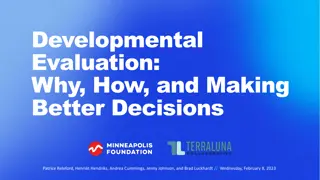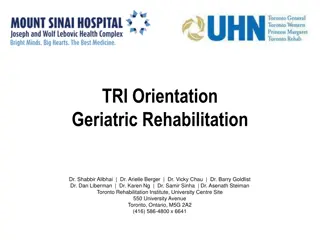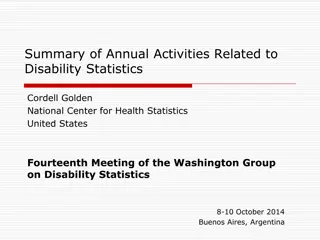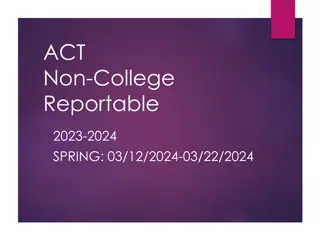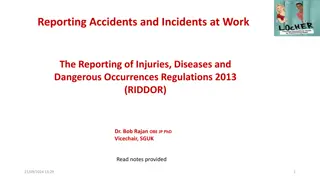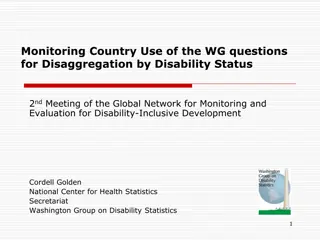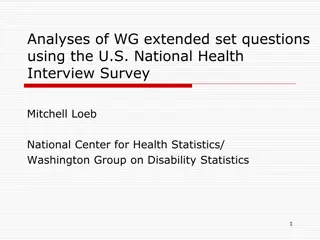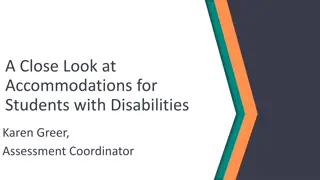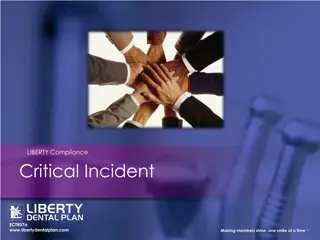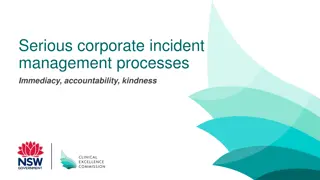Reportable Incidents in Developmental Disability Care
The report outlines the criteria for incidents to be classified as reportable in the context of intellectual and developmental disabilities care. It covers various types of incidents, including abuse, neglect, serious injuries, and behavioral or medical incidents requiring specific interventions. The document also details the interventions that necessitate reporting, such as hospitalization, restraints, protective equipment, crisis team responses, and emergency medical procedures. Adherence to these guidelines ensures the safety and well-being of individuals with developmental disabilities.
Download Presentation

Please find below an Image/Link to download the presentation.
The content on the website is provided AS IS for your information and personal use only. It may not be sold, licensed, or shared on other websites without obtaining consent from the author.If you encounter any issues during the download, it is possible that the publisher has removed the file from their server.
You are allowed to download the files provided on this website for personal or commercial use, subject to the condition that they are used lawfully. All files are the property of their respective owners.
The content on the website is provided AS IS for your information and personal use only. It may not be sold, licensed, or shared on other websites without obtaining consent from the author.
E N D
Presentation Transcript
DEPARTMENT OF INTELLECTUAL AND DEVELOPMENTAL DISABILITIES Reportable Incident Form Instructions and Definitions August 2012 9/28/2024
WHAT MAKES AN INCIDENT REPORTABLE? Allegations of: Abuse: physical, sexual or emotional Neglect Exploitation: of money, goods or person Serious Injury of Unknown Cause Suspicious Injuries Death Incidents of: Sexual Aggression Missing Person longer than 15 minutes Criminal Conduct Property Destruction greater than $100 Serious Injury to person supported Serious Injury to another person as a result of a behavioral incident by a person supported Reportable Staff Misconduct Other Types of Incidents (car accidents, house fire, burglary of residence) Certain types of medication variances (as necessitated by the Medication Variance Policy and Form) Specific Behavioral and/or Medical Incidents (with required interventions, see next slide) 9/28/2024
REPORTABLE BEHAVIORAL & MEDICAL INCIDENTS These incidents are reportable when there is one or more of the following interventions utilized: Hospital Emergency Room also includes an Urgent Care facility when NOT used in lieu of a PCP visit. Psychiatric/Medical Hospitalization any hospital admission whether planned or unplanned. Routine, age related testing is not considered reportable. Manual or Mechanical Restraints these include all behavior related restraints, regardless of length of time used, type or approved by a plan (all take-downs and prone restraints are prohibited). Restraints used in the course of medical treatment, positioning or in the prevention of an accident are not considered behavior related and not considered reportable unless another intervention is utilized. Protective Equipment application of a device to a person s body part to prevent injury/harm as related to a behavioral incident. To include helmets, mitts, etc. Mental Health Mobile Crisis Team response by an independent mental health agency team to assess behavioral/psychiatric crises. Emergency Psychotropic Medication Administration psychotropic medication administration in response to a specific behavioral event which is NOT part of a routine medical order and NOT prescribed for a specific medical procedure. This requirement includes PRN medications administered in response to a behavioral event. Police in person response by law enforcement personnel. Incarceration includes being jailed after an arrest or conviction of a crime. Abdominal Thrust (Heimlich Maneuver) certified staff s use of an emergency technique to dislodge food or other object lodged in the windpipe. 911 call fire, police or emergency ambulance response. CPR certified staff use of CPR to sustain breathing and heart function. X-Ray use of any imaging technique to determine whether a person supported has a fracture (this does not include imaging techniques used to diagnose illness). 9/28/2024
COMPLETING THE REPORTABLE INCIDENT FORM 9/28/2024
NAME OF PERSON SERVED Type the legal last name, first name and middle initial. Reportable Incidents apply only to persons receiving services. Do not enter names of staff or other persons in this box. A Reportable Incident Form must be completed for each person served involved in an incident. 9/28/2024
SOCIAL SECURITY NUMBER Enter the Social Security Number of the person served. This is to correctly identify persons who have the same name. 9/28/2024
DATE AND TIME OF INCIDENT Enter the MONTH/DAY/YEAR and TIME that the incident occurred using standard time notation (AM/PM). If the incident was not witnessed by anyone, enter the DATE/TIME the incident was discovered. Sometimes it happens that someone witnessed an incident but it is not reported until later. In these cases, it is important to enter the DATE/TIME of when the incident was actually WITNESSED. The time sequence should be included in the narrative. The DATE/TIME at the top of the page should ALWAYS be earlier than the DATE/TIME the incident was reported. 9/28/2024
PROVIDER RESPONSIBLE Enter the name of the PROVIDER (agency) responsible for person served at the time of the incident. If the person served was not under the responsibility of a Provider at the time of the incident, enter UNSPECIFIED in this box. 9/28/2024
PROVIDER CODE Enter the Provider Code in this box. It can be entered by Incident Management Coordinator when reviewing the form prior to forwarding to DIDD. 9/28/2024
PROVIDER REPORTING If the Provider reporting the incident is different than the Provider Responsible, enter that in this box. 9/28/2024
WITNESSED/DISCOVERED If the incident was witnessed BY ANYONE, check the appropriate box (staff, person served or other person) The person completing the form does not have to be the person who witnessed the incident If the incident was not witnessed by any person, check the box next to DISCOVERED (e.g.: discovered injuries) 9/28/2024
WHERE INCIDENT OCCURRED Check the most appropriate box to indicate where the incident occurred If the incident involved more than one location, select the location where the majority of the incident occurred Discovered incidents will most likely have an UNKNOWN location but not always Type the address or location where the incident occurred or was discovered 9/28/2024
THIS INCIDENT REQUIRED If one of these boxes is checked, this incident is reportable to DIDD. More than one box may be checked. 9/28/2024
BRIEF DESCRIPTION OF INCIDENT Summarize the incident in question, being careful to include pertinent information such as who, what, when and where. Additionally, include information that was discovered later such as a medical diagnosis. Do not use abbreviations, including abbreviations for medical terms. If necessary, use this area to discuss a sequence of events, especially when the time/date of the incident is unknown. Be cognizant of how the narrative is written. Reportable Incident Forms are read by a multitude of persons within DIDD. Errors that should be corrected prior to submission include spelling errors, punctuation, grammatical errors and disorganized thought. A RIF is a representation of the Provider that submits it. Incident Management Coordinators should not change the content of a RIF but should review it for accuracy. Be sure to identify all persons involved, for example, who is a staff person and who is the person served. 9/28/2024
DESCRIPTION OF INJURY Give a brief description of the injury sustained only by the person served. Include type, size, location and color. Describe the type and location of treatment. Do not use abbreviations, including abbreviations for medical terminology. If the incident is clearly described within this section, it is not necessary to forward a copy of additional records such as medical or police forms. However, these documents may be requested by Incident Management or by an Investigator. 9/28/2024
INJURY TO OTHERS If a person other than the person served receives a SERIOUS INJURY as the result of a behavioral incident by the person served, check the appropriate box. SERIOUS INJURY is any injury which required assessment and treatment beyond first aid. There has to be an assessment as well as treatment by a medical professional. Behavioral incidents qualifying for this includes physical aggression, SIB and/or property destruction. The type of injury can be described in the narrative of the form. This helps determine whether the incident met the criteria for reporting to DIDD. 9/28/2024
NOTIFIED Document all notifications made with accurate date/time. The Chief Officer/AOD section is for Developmental Centers and private ICF/ID facilities. Community Providers will contact the Regional Office AOD when necessary. Notification to Adult Protective Services or Department of Children Services. Be sure to include the name of the Investigator contacted when reporting an allegation of Abuse, Neglect or Exploitation. 9/28/2024
PERSON WRITING THIS REPORT Type the name and title of the person completing the report. Enter the date/time the report was completed. This should not be before or at the same time the incident occurred. Incident Management does not require that a signed copy of the RIF be submitted but the Provider should maintain a signed copy. 9/28/2024
INCIDENT MANAGEMENT COORDINATOR REVIEW Provider IMC reviews and corrects any information necessary on the RIF. If applicable, the IMC will document any additional information gathered after the initial incident was reported. There is space provided for this information to be added underneath the section labeled Type of Incident . 9/28/2024
TYPE OF INCIDENT All BOLDED types must be reported to DIDD Investigations within four (4) hours. Check only the box that best identifies the type of incident reported. 9/28/2024
TYPES OF INCIDENTS THAT REQUIRE A CALL TO INVESTIGATIONS Alleged Abuse the knowing infliction of injury, unreasonable confinement, intimidation or punishment with resulting physical harm, pain or mental anguish. Physical Abuse Sexual Abuse Emotional/Psychological Abuse Alleged Neglect Failure to provide goods or services necessary to avoid physical harm, mental anguish or mental illness, which results in injury or probable risk of serious harm. Exploitation the deliberate misplacement, misappropriation or wrongful, temporary or permanent use of belongings or money with or without the person s consent. Illegally or improperly using a person or person s resources for another s profit or advantage. Serious Injury of Unknown Cause A serious injury is discovered and cause can not be determined. A serious injury is an injury that requires assessment and treatment by a medical professional and includes but is not limited to fractures, dislocations, concussions, laceration/cut requiring sutures, staples or Dermabond, etc (see description under Serious Injury ). Suspicious Injury an injury to a person where abuse or neglect is suspected, or does not coincide with explanation of how injury was sustained. Death report to Investigations only if abuse or neglect is suspected, suspicious or unexplained. 9/28/2024
OTHER TYPES OF INCIDENTS THAT ARE REPORTED WITHIN ONE BUSINESS DAY Reportable Behavioral/Psychiatric Incident (subcategories used by DIDD) Serious Injury to others as a result of behavioral/psychiatric incident Property Destruction over $100 Physical Aggression Self-Injurious Behavior Suicide Attempt Swallow Inedible/Harmful Matter 9/28/2024
CONTINUED Sexual Aggression acts of sexual aggression by a person served toward any other person. Missing Person (> 15 minutes) person served is missing for longer than 15 minutes unless the person s plan specifies there is no risk of harm to self or others to be unsupervised for longer than 15 minutes. 9/28/2024
CONTINUED Reportable Medical Incident (subcategories used by DIDD) Choking Fall Insect/Animal Bite Reportable Health Issue: Constipation Reportable Health Issue: Dehydration Reportable Health Issue: Urinary Tract Infection Reportable Health Issue: Skin Issue Reportable Health Issue: Pneumonia Seizure Unusual Physical Reaction (allergic reaction) 9/28/2024
CONTINUED Criminal Conduct Criminal conduct or probable criminal conduct by a person served. Other Type of Incident car accidents, residence burglarized, house fire. Reportable Staff Misconduct (subcategories used by DIDD) Exploitation under $50 Treatment Plan not Followed Poor Quality of Supervision Staff Convenience Unacceptable Activity Violation of Rights Other 9/28/2024
INJURY TYPE No Apparent Injury injury is not known at time of incident or there is no injury after assessment. Minor Injury injuries that do not require treatment beyond first aid but are the result of a reportable incident. Serious Injury injuries that may be self inflicted or inflicted by another, accidental or not, known or unknown cause, and do require assessment and treatment by a medical professional. Includes but is not limited to: Fractures Dislocations Concussions Cut/laceration requiring sutures, staples or Dermabond Torn ligaments 2nd and 3rd degree burns Loss of consciousness Sprain or strain 9/28/2024
FORWARDING RIF TO DIDD Completed and reviewed (by the agency IMC) RIF should be emailed (or faxed if email unavailable) to DIDD.Incidentmgmt@tn.gov (or 1-877-551-5591) As soon as possible but no later than the next business day after the incident is reported, witnessed or discovered. All allegations, serious injuries of unknown cause, suspicious injuries and unexplained or suspicious deaths must be reported to the DIDD Office of Investigations as soon as possible but no later than four (4) hours following the discovery of the incident. 9/28/2024
THINGS TO REMEMBER Be sure to use the most current RIF (July 2013). There are RIFs for each region. Please make sure you are using the correct RIF for the region in which you are reporting the incident. Emailed RIFs will receive confirmation of receipt from DIDD. RIFs should be typed. Illegible RIFs will be returned for resubmission. 9/28/2024




